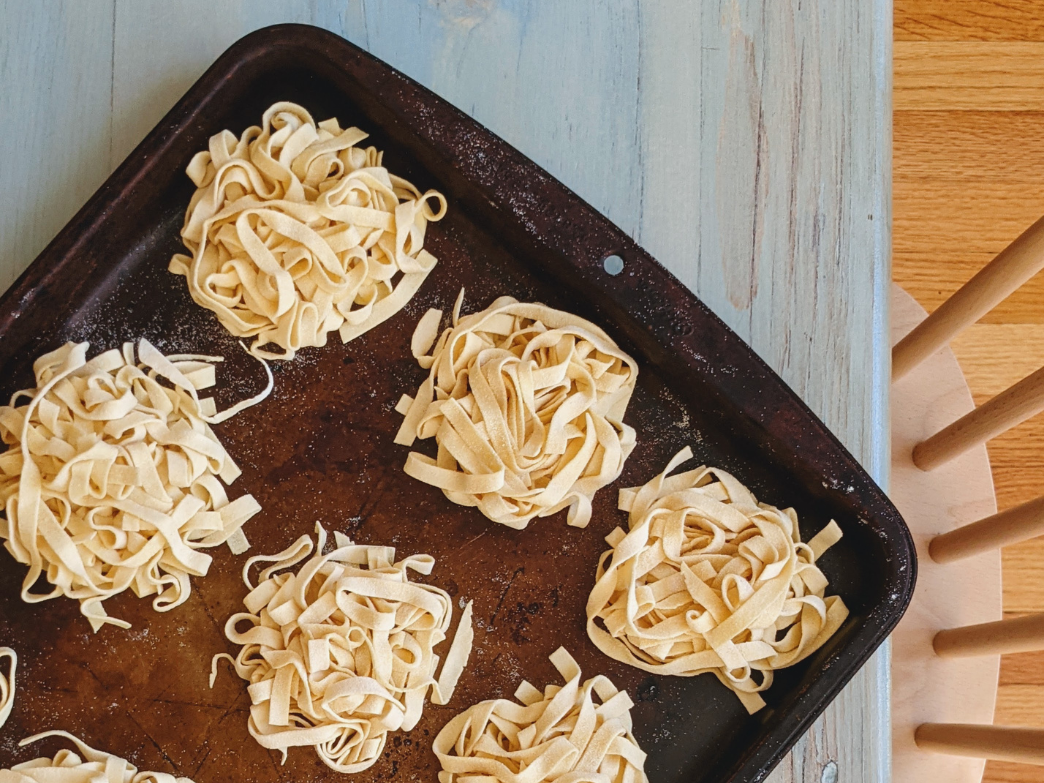By Lucy Yanckello, Ph.D.
Vegetarian diets – focused on plant-based foods – have many benefits. These benefits include reducing the risk of chronic illnesses such as obesity, heart disease, and certain cancers. The staples of a vegetarian diet are eaten by most people on a regular basis – fruits, vegetables, whole grains, beans, and legumes. Pasta is a great addition to any plant-based diet, since it is made from grain, easy to cook, and easy to incorporate with other vegetarian staples for full and nutritious meals.
Can vegetarians eat pasta? Can vegetarians eat any type of pasta?
Vegetarians can eat pasta. The only ingredients included in dried pasta are usually wheat flour and water. Fresh pasta usually includes egg. If you are a vegetarian that does not consume eggs, be sure to check that the pasta you are buying does not have egg listed as an ingredient. Examples of pasta that contain animal-based ingredients (other than eggs) is squid ink pasta, which uses squid ink to dye the pasta black, and ravioli filled with meat.
What pasta is best for vegetarians? What vegetarian pasta is healthiest?
There are many different types of pasta on the market that vegetarians can eat – with different choices whether you are trying to increase your protein intake, fiber intake, or both.
At the top of the list of healthiest pasta for vegetarians is whole-wheat pasta, which can include 3 grams of fiber and 8 grams of protein per serving. Whole-wheat pasta will bump up the nutrition of your dish. Most people don’t eat enough fiber – which is good for our hearts and digestion – so consuming whole-wheat pasta can help increase fiber intake. Although it’s not made with a whole-grain, classic white flour pasta has a similar nutritional profile to whole-wheat pasta in terms of protein and fiber (9 grams and 3 grams respectively).
There are also options of alternative pastas that will increase protein intake. These pastas include chickpea flour pasta and red lentil flour pasta. Both have at least 14 grams of protein per serving. Chickpea pasta also has 8 grams of fiber per serving, making it a filling and nutritious choice. In addition, red lentil pasta will provide you with 20% of your daily iron, which is important for vegetarians since they do not get iron from meat.
What pasta dishes are best for vegetarians? What Italian pasta dishes are vegetarian?
The best pasta dishes for vegetarians focus on vegetables such as pasta primavera, ravioli, tortellini, or pasta with plain tomato sauce, which are all Italian dishes that are vegetarian. It is also possible to substitute the meat out of most pasta dishes if you make them at home by using beans, vegetables, or meat substitutes instead.
What pastas and pasta dishes can vegetarians not eat?
Vegetarians can eat most types of pasta, especially if they eat eggs. Pasta dishes on the other hand are not as cut and dry. Meat-focused dishes such as spaghetti bolognese, lasagne, or meat-filled ravioli are a no go for vegetarians. However, when making pasta at home, meat can be substituted for beans or vegetables in most dishes, or meat substitutes if preferred.
How to increase protein in vegetarian pasta?
There are several options to increase protein intake in vegetarian pasta. One option is to use alternative pastas like chickpea flour pasta and red lentil flour pasta. Both have at least 14 grams of protein per serving and chickpea pasta also has 8 grams of fiber per serving, making it a filling choice. Another option is to include beans or high protein veggies like broccoli and pasta in your pasta dishes to increase the protein content of vegetarian pasta dishes.
Where can I buy the best vegetarian pasta online?
At Wildgrain, we specialize in making high-quality, fresh breads and pastas that are delivered directly to your door. Wildgrain is the first bake-from-frozen delivery subscription service for breads, rolls, pastries, and fresh pastas. Some of our popular pastas include tortellini, rigatoni, and fettuccine as well as our classic marinara tomato sauce. We are proud to offer healthy pasta, made with non-GMO flour and without added sugar or preservatives. Learn more about Wildgrain and our artisanal baking and cooking methods.
About the Author
Lucy Yanckello received her Ph.D. in nutrition from the University of Kentucky College of Medicine. She currently works as a medical writer and enjoys being able to help people better understand nutrition and science.
This content is for informational use only and does not replace professional nutrition and/or medical advice, diagnosis or treatment. It is not a substitute for and should not be relied upon for specific nutrition and/or medical recommendations. Please talk with your doctor about any questions or concerns.



